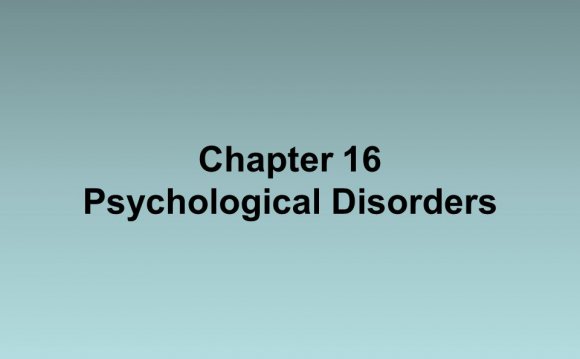
- Criteria for defining psychological disorders depend on whether cultural norms are violated, whether behavior is maladaptive or harmful, and whether there is distress.
- The medical model describes and explains psychological disorders as if they are diseases.
- The vulnerability-stress model states that disorders are caused by an interaction between biological and environmental factors.
- The learning model theorizes that psychological disorders result from the reinforcement of abnormal behavior.
- The psychodynamic model states that psychological disorders result from maladaptive defenses against unconscious conflicts.
- Psychologists use objective and projective tests to assess psychological disorders.
Classification
- Classification allows psychologists to describe disorders, predict outcomes, consider treatments, and study etiology.
- Insanity is a legal term, not a diagnostic label.
- Psychologists and psychiatrists use the DSM to diagnose psychological disorders.
- The DSM uses a multi-axial system of classification.
- The DSM is a useful tool but has been criticized for several reasons.
- Most of the major disorders in the DSM are found worldwide.
- Culture-bound syndromes are limited to specific cultural contexts.
Anxiety Disorders
- A chronic, high level of anxiety may be a sign of an anxiety disorder.
- Generalized anxiety disorder involves persistent and excessive anxiety for at least six months.
- Having a specific phobia means becoming anxious when exposed to a specific circumstance.
- Social phobia is characterized by anxiety in social or performance situations.
- A person with panic disorder experiences recurrent, unexpected panic attacks.
- Agoraphobia involves anxiety about having panic attacks in difficult or embarrassing situations.
- Obsessive-compulsive disorder entails obsessions, compulsions, or both.
- Post–traumatic stress disorder is a set of psychological and physiological responses to a highly traumatic event.
- Biological factors implicated in the onset of anxiety disorders include genes, different sensitivity to anxiety, the neurotransmitters GABA and serotonin, and brain damage.
- Conditioning and learning may contribute to the development of phobias.
- Some styles of thinking may make people more susceptible to anxiety disorders.
- Neuroticism is associated with anxiety disorders.
Mood Disorders
- Mood disorders are characterized by marked disturbances in emotional state, which cause physical symptoms and affect thinking, social relationships, and behavior.
- Mood disorders may be unipolar or bipolar.
- People with dysthymic disorder have depressed mood for at least two years.
- Major depressive disorder involves at least one period with significant depressive symptoms.
- Bipolar disorders involve at least one period with manic symptoms and usually depressive periods as well.
- Biological influences on mood disorders include genes, the neurotransmitters norepinephrine and serotonin, and brain abnormalities.
- There is a two-way relationship between negative thinking and depression.
- Cognitive characteristics of depressed people include learned helplessness; a pessimistic worldview; hopelessness; a tendency to make internal, stable, global attributions; and a tendency to ruminate.
- There is a two-way relationship between social support and depression.
- Depression may be related to experiences of loss.
- The onset and course of mood disorders may be influenced by stress.
Eating Disorders
- Eating disorders are characterized by problematic eating patterns, concerns about body weight, and inappropriate efforts to control weight.
- Anorexia nervosa entails very low body weight, fear of gaining weight, and distorted body image.
- Bulimia nervosa involves binge eating and unhealthy efforts to control body weight.
- Some people may have a genetic vulnerability to eating disorders.
- Eating disorders may be associated with particular personality traits.
- Cultural factors strongly influence the onset of eating disorders.
- Lacking autonomy in the family and having an overly weight-conscious mother may influence the onset of eating disorders.
- People with eating disorders tend to have certain distortions of thinking.
- The onset of anorexia nervosa may be associated with stressful events.
Somatoform Disorders
- Somatoform disorders are characterized by real physical symptoms that cannot be fully explained by a medical condition, the effects of a drug, or another mental disorder.
- A person with somatization disorder has many different, recurrent physical symptoms.
- Conversion disorder involves symptoms that affect voluntary motor functioning or sensory functioning.
- People with hypochondriasis constantly fear that they may have a serious disease.
- People with histrionic personality traits may be more likely to develop somatoform disorders.
- Several cognitive factors may contribute to somatoform disorders.
- People with somatoform disorders may learn to adopt a sick role.
Substance-Related Disorders
- Many substance-related disorders are described in the DSM.
- Substance abuse is a maladaptive pattern of drug use that results in repeated, negative legal, social, occupational, or academic consequences.
- Substance dependence involves continuing to use a drug despite persistent harmful physical or psychological consequences.
- The disease model of addiction holds that addiction is a disease that must be treated medically.
- The learning model of addiction holds that addiction is a way of coping with stress.
- Genes may produce a predisposition to substance dependence.
- Several lines of evidence suggest that environmental factors play a key role in substance dependence.
Schizophrenia
- Schizophrenia is a psychotic disorder that includes positive and negative symptoms. There are several subtypes of schizophrenia.
- The paranoid type is characterized by marked delusions or hallucinations and relatively normal cognitive and emotional functioning.
- The disorganized type involves disorganized behavior, disorganized speech, and emotional flatness or inappropriateness.
- The catatonic type is characterized by unnatural movement or speech patterns.
- A diagnosis of undifferentiated type applies if diagnostic criteria are not met for any of the above three subtypes.
- Research suggests that genes, neurotransmitters, and brain abnormalities are involved in the onset of schizophrenia.
- Stress may help to induce schizophrenia in people who are already biologically vulnerable to the disorder.
Share this Post
Source: www.sparknotes.com










